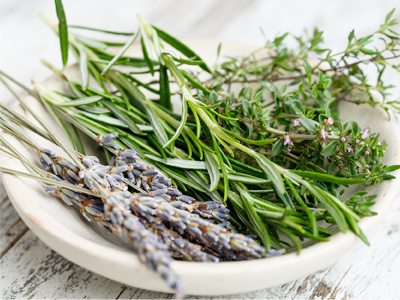I’ve recently encountered a few people that have made foraging an outdoor weekend adventure, bringing home wild roots and herbs, however sometimes it’s nearly impossible to know where to look.
I prefer to keep things simple when teaching about the benefits of herbal medicine. Below are five ways you can introduce this healing into your life without packing up the tent and heading into unfamiliar territory.
1. Tinctures
Grow your own small herb garden (indoors or outdoors depending on climate) or purchase fresh herbs at your local farmer’s market or organic section at the grocery store. Hang the herbs to dry; once dried, place the herbs in a clean glass jar with your choice of apple cider vinegar or a well-distilled clear alcohol such as dry gin, known for its anti-inflammatory properties. Some great ones to soak in gin for a sublingual tincture include ginger root (chop and lay flat to dry) and mint for a digestive aid or oregano and thyme for building immunity against colds and flu. Set aside for 30 days and shake jar once a day. Strain at the end of the month (organza cloth works better than cheesecloth) and put into dropper bottles. Store in a cool, dry place for 6 months and use as needed.
2. Teas
Purchase already dried herbs and blend using a mortar and pestle. (The crushing of the herbs brings out the healing properties) Place in a tea ball, boil water and consume as a hot or cold tea; allow hot tea to cool to room temperature and then refrigerate to keep for up to several days. For taste, sweeten with a small amount of raw honey (1 tsp) if you are not allergic to bee products.
3. Chewing
Upset stomach? Chew a very small amount of fresh ginger root (for gas, bloating or “heavy” gut) or fresh mint (for indigestion). Sinusitis? Chew on a small amount of fresh horseradish root. Ginger and horseradish root are hot, so use caution if you aren’t used to fire energies for healing excessive water energies.
4. Cooking
Using simple herbs such as parsley, rosemary, sage and thyme in your broths, stews and other dishes can bring an aromatic and healthful boost to your meals. The following benefits are in all four of these herbs.
- Anti-inflammatory and anti-oxidant
- Improves digestion and cognitive function
- Cancer and Alzheimer’s preventative
5. Topical
Poultices and liniments for pain, inflammation and bruising can be easily made by combining a few ingredients readily available at your local health food store or online. I prefer using witch hazel over rubbing alcohol for the base. For a cooling muscle liniment, combine dried or fresh lavender and mint (chop if fresh) in a witch hazel base, allow to sit for about 30 days, shaking once a day and strain the herbs out at the end of the month into a clean glass jar. Apply as needed for pain.
Using herbal medicine can be an easy and healthful way to stay mentally sharp, physically active and spiritually mindful as nature is a potent and powerful instructor.




